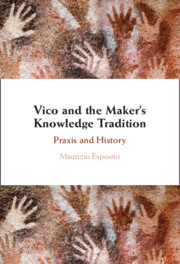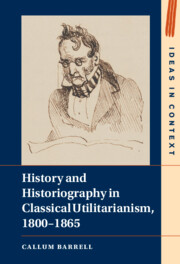Refine search
Actions for selected content:
9 results

Vico and the Maker's Knowledge Tradition
- Praxis and History
-
- Published online:
- 27 June 2025
- Print publication:
- 17 July 2025
17 - Early Modernizers of Politics
- from Part V - Democracy beyond Modernity
-
- Book:
- Can Democracy Recover?
- Published online:
- 02 January 2025
- Print publication:
- 16 January 2025, pp 165-179
-
- Chapter
- Export citation
6 - The Crisis of Enlightenment
- from Part I - Romantic Genealogies (1750–1790)
-
-
- Book:
- The Cambridge History of European Romantic Literature
- Published online:
- 10 January 2024
- Print publication:
- 09 November 2023, pp 188-220
-
- Chapter
- Export citation
5 - Making Sex Change
- from Part II - The Truth Factory
-
- Book:
- The Making Sense of Politics, Media, and Law
- Published online:
- 06 April 2023
- Print publication:
- 13 April 2023, pp 92-110
-
- Chapter
-
- You have access
- Open access
- HTML
- Export citation
8 - Political Confection
- from Part III - The Acting President
-
- Book:
- The Making Sense of Politics, Media, and Law
- Published online:
- 06 April 2023
- Print publication:
- 13 April 2023, pp 163-182
-
- Chapter
-
- You have access
- Open access
- HTML
- Export citation
4 - The Truth Factory
- from Part II - The Truth Factory
-
- Book:
- The Making Sense of Politics, Media, and Law
- Published online:
- 06 April 2023
- Print publication:
- 13 April 2023, pp 63-91
-
- Chapter
-
- You have access
- Open access
- HTML
- Export citation
Chapter 5 - J. S. Mill and Historical Relativism
- from Part III - Sciences of History
-
- Book:
- History and Historiography in Classical Utilitarianism, 1800–1865
- Published online:
- 24 September 2021
- Print publication:
- 07 October 2021, pp 147-184
-
- Chapter
- Export citation
Chapter 4 - J. S. Mill’s Historical Criticism
- from Part II - Historicism and Historiography
-
- Book:
- History and Historiography in Classical Utilitarianism, 1800–1865
- Published online:
- 24 September 2021
- Print publication:
- 07 October 2021, pp 116-144
-
- Chapter
- Export citation

History and Historiography in Classical Utilitarianism, 1800–1865
-
- Published online:
- 24 September 2021
- Print publication:
- 07 October 2021
